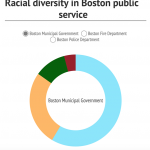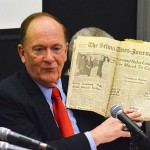Boston University rolled out two Massive Open Online Courses in September and will offer three additional MOOCs this academic year, providing any student with access to the Internet a free, quality education they may not be able to receive elsewhere.
Students around the world have the chance to register for a variety of online courses offered by BU through edX, a free online education platform that houses classes taught by professors across the country.
BU’s inaugural MOOC, which was held in May, titled, “Sabermetrics 101: Introductions to Baseball Analytics,” had an enrollment of about 18,000 students, said Director of BU’s Digital Learning Initiative Chris Dellarocas.
About 13,000 students have registered for BU’s MOOC, “The Art of Poetry,” which began Tuesday, and 10,600 students have signed up for “War for the Greater Middle East,” launched Sept. 24. Almost 4,000 have already enrolled for “Alien Worlds: The Science of Exoplanet Discovery and Characterization,” a course slated to begin Oct. 31, Dellarocas said.
Nationwide, 7.1 million students are enrolled in at least one online course, a Babson study released in January found. BU is among the 5 percent of higher education institutions offering MOOCs, placing them in a tier of 30 schools worldwide that offer the option.
The DLI is unable to determine how many of those registered for MOOCs are BU students, as edX does not disclose information on those enrolled in their courses, Dellarocas said.
BU will offer “Introduction to Differential Equations” and “AP Physics 1” in 2015, Dellarocas said, both of which have projected enrollments of over 1,000 students.
Andy Andres, professor of natural science in the College of General Studies, taught BU’s first MOOC in May.
“The MOOC completely expands opportunities for learning. It goes beyond my ability to access a small group of students,” he said. “Thousands of people have the chance to learn this material when they had no chance to do so before. MOOC helps the world of learners understand that BU is serious about education.”
MOOCs have tentatively been shown to be as effective a learning tool as traditional lectures, regardless of how students prepare for a course online or in the classroom, a September study conducted by researchers at the Massachusetts Institute of Technology found.
Andres first taught the course on baseball analytics at Tufts University in yearly installments, he said.
“In person, there is a little more forgiveness,” he said. “Teaching a MOOC is kind of like writing the modern version of the textbook because it’s going to be permanent. It’s going to stay out there forever.”
Andrew West, professor of astronomy in the College of Arts and Sciences, teaches an astronomy course at BU that serves as the basis for his upcoming MOOC, Alien Worlds.
West hopes about 8,000 students will enroll in the course, he said.
“There are people in the world who don’t have access to a Boston University education,” he said. “They don’t have finances. They come from socioeconomic backgrounds for which college wasn’t much of an option.”
Though MOOCs offer students a unique learning opportunity, the growth of digitized classes concerns some professors who are unsure of the medium’s potential to alter higher education, West said.
“I have colleagues who are very worried that this sort of online learning could have the potential to replace faculty and the normal university experience,” he said. “Once you have the content and the course, you could essentially imagine BU selling this to some third-party entity, and that worries me. I think people will want the human interaction of talking to their professors and asking a question.”
Kolby Weisenburger, a 2014 CAS graduate who worked as an undergraduate course assistant for West’s MOOC, said she would like to see a greater diversity of professors that teach MOOCs at BU.
“I’m disappointed by the lack of a single female or minority professor and feel BU sends a poor message to the thousands signed up for these courses,” she said.
“The Art of Poetry,” taught by former U.S. Poet Laureate and BU Creative Writing Professor Robert Pinsky, is not filmed in a classroom, Pinsky said in an email.
Instead, the class is recorded in BU’s Boston Playwrights’ Theatre and features short lectures, discussions and videos from “Pinsky’s Favorite Poem Project,” which gathers videos of Americans reading poems they are passionate about.
While the medium is different, the material and “the effort to be interesting, the desire to be useful” have not changed, Pinsky said.
“Online learning is an unknown land — maybe for everybody, certainly for me,” he said. “The material and goals are the same, but the two experiences are quite different.”




